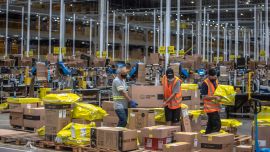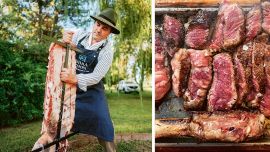The giant pots simmering in Dagna Aiva’s kitchen explain the long line of people outside her house located in a gritty district of southern Buenos Aires, where the economic crisis is hitting locals hard.
Aiva feeds 200 people a day from those steaming pots in Villa 21-24, the urban face of Argentina’s economic crisis.
For hard-bitten locals on its tough streets, talk of stock markets and the strength of the safe-haven dollar is a risible middle-class obsession – here the priority is simply putting food on the table, despite living in a country that produces food for some 400 million people – more than 10 times Argentina’s population.
There is little talk of dollars here, on this poor settlement of 60 hectares where some 60,000 families live facing the Riachuelo River, which borders the barrio.
“I don’t have any dollars, what can they do for me? There are other basic needs I have to find a solution for,” says Aiva.
“We must give priority to other things, to pay the day to day, to eat every day,” the 48-year-old activist adds.
A long, silent line forms in the alley outside as women with toddlers, the elderly and disabled shuffle up to her kitchen door, shopping bags ready to take away food. Inside, women wearing aprons and hair covers ladle meat and vegetables from the pots into Tupperware containers.
Argentina’s economic tails- pin has seen the peso lose half its value, unemployment soar and the economy shrink by 5.8 percent in the first quarter. Argentines have seen their earnings, savings and purchasing power diminished.
‘ZERO POVERTY’
Avia’s home houses the local social centre called “Casa Usina de Sueños,” which translates as “Dream Factory” – a space that includes a picnic area and provides academic support for children.
“Here, it’s full of people who work a lot, it’s sad to see that they cannot have enough to eat,” said Avia, gazing out at the polluted river.
Argentina – South America’s second-largest economy and a land of contradictions with a widening gap between rich and poor – is also one of the continent’s three countries where hunger has increased in 2018, alongside Venezuela and Guatemala.
An average basket of house-hold goods costs 4,200 pesos – 57 percent higher than in July last year, and well above wage increases.
“I don’t have dollars... but I worry because inflation has a lot to do with the dollar,” said retired nurse Palomo Gómez, 50.
President Mauricio Macri, in power for four years and seeking re-election in October, had promised to reach the goal of “zero poverty” during his term. Instead, poverty has deepened to reach 32 percent of the population, according to official figures.
Likewise, Macri – forced to seek a US$57-billion bailout from the IMF last year – has failed to tame inflation, now running at over 50 percent, and his government has recognised that the country’s 10 percent unemployment rate will worsen.
MORE MEALS
Former health minister Daniel Gollan, who served in former president Cristina Fernán- dez de Kirchner’s administration, recently highlighted one of the crisis’ most troubling statistics: that five million children and adolescents have been plunged into a “critical food situation.”
Trade unions and social organisations, as well as the Catholic Church and opposition parties, have demanded the government declare a “food emergency.” That would allow more funds to be allocated to manage an increasingly desperate situation.
The government has mostly refused so far. “There are situations of poverty, but that does not mean that there is hunger,” Culture Secretary Pablo Avelluto said recently.
Macri, however, has acknowledged the situation, saying he understands the “anger” and “pain” generated by worsening poverty data. He has vowed to fix the situation, should he win re-election in October.
The six women who distribute food from Avia’s kitchen receive a “complementary social salary” from the State, equivalent to half the minimum wage, 7,500 pesos (US$110 currently). It’s hardly enough to get by.
Municipal authorities supply enough meat and vegetables every day to make 160 meals, but the women say they manage to stretch their supplies out to feed 200.
The IMF is expected to disburse the latest tranche of the loan, US$5.4 billion, next month. The favourite to win October’s election, Peronist candidate Alberto Fernández, has repeatedly assured the IMF that Argentina would meet its debt obligation, but not at the expense of the people.
The Frente de Todos presidential hopeful is expected to try to renegotiate the agreement after the election, in a bid to ease debt repayments.
The vote in areas like Villa 21-24 is likely to be overwhelmingly pro-Fernández come October, as Argentina’s poor hope for some respite. But for them, the priority remains putting the next meal on the table.
related news
by LILIANA SAMUEL & MAGALI CERVANTES























Comments